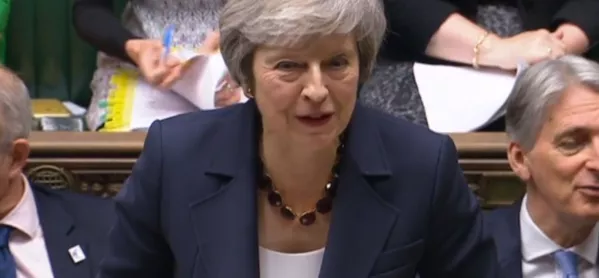Theresa May was met with heckling, as she defended the government’s funding of education for 16- to 18-year-olds.
At today’s Prime Minister’s Questions, Labour MP for Makerfield, Yvonne Forvargue, asked Ms May if she agreed that it was time to “raise the rate”.
Ms Forvargue added: “I’m privileged to have two award-winning sixth-form colleges in my constituency. However, with no increase in funding since 2010, Winstanley College has cut German A level from the syllabus and St John Rigby has drastically reduced pastoral support. Does the prime minister believe, like the chancellor, that these are just little extras or will she agree it’s time to raise the rate?”
Theresa May responded, “Of course, if you look across what we’ve been doing in funding for education overall, we have been putting extra money into funding…” but was cut short by heckling.
The prime minister continued: “Everybody says ‘not in FE’ - actually, in FE we’ve invested nearly £7 billion this year to make sure there’s an education or training place for every 16- to 19-year-old who wants one.
“We’re also transforming technical education through the T levels, and with £500 million a year once they’re fully rolled out going into that. And by 2020, the funding available to support adult participation in further education is planned to be higher than at any time in England’s history.”
Call for extra funding rejected in budget
The Raise the Rate campaign, which the Labour MP eluded to, was launched prior to the chancellor’s autumn budget last month.
A coalition of 12 organisations representing school and college leaders, governors, teachers and support staff in England wrote to the chancellor calling for an increase in the funding rate for 16- to 18-year-olds in schools and colleges, by at least £200 per student, in the budget. However, this request was no granted.
The campaign cites research from education consultancy London Economics that calls for a £760-per-student increase to sixth-form funding, to be raised annually in line with inflation. It says that this figure is the minimum needed to increase funding to the level required to protect subjects at risk of being dropped, and to increase extracurricular activities, work experience opportunities and university visits.
‘A strong post-Brexit economy’
The letter to the chancellor stated: “This sustained underinvestment in sixth-form education is having a negative impact on the education of students, the financial health of schools and colleges, and the ability of government to achieve its ambitions for the economy and society.
“Only a significant increase in the national funding rate for 16- to 18-year-olds will make it possible for the government to meet its objectives for a strong post-Brexit economy and a socially mobile, highly educated workforce.”




